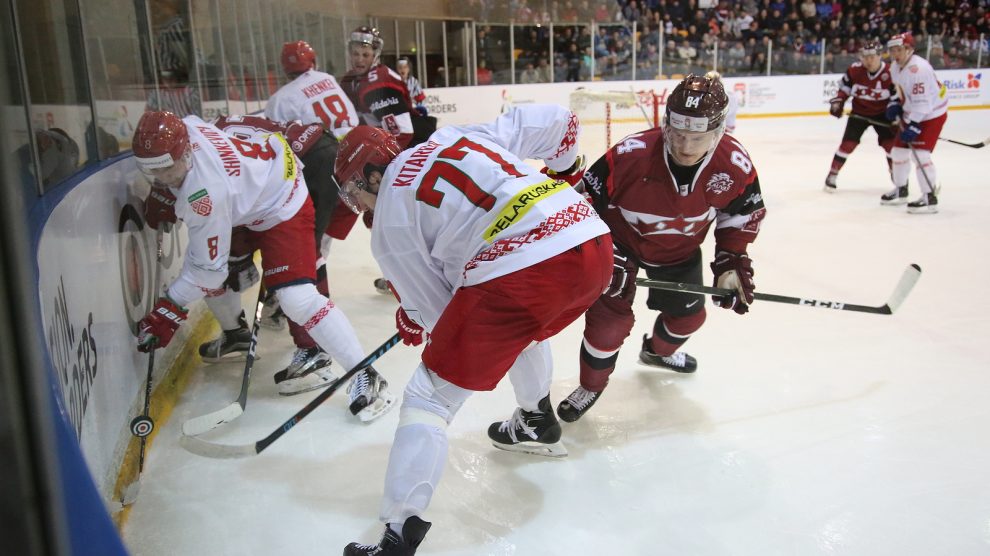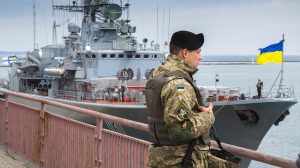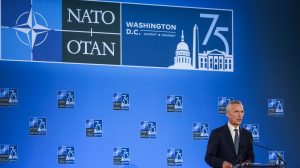Central Europe
Poland said on Thursday that the waiver of US sanctions on the company behind Russia’s Nord Stream 2 gas pipeline was a threat to energy security in Central and Eastern Europe. US President Joe Biden waived sanctions on Nord Stream 2 AG and its chief executive earlier this week as the US seeks to rebuild ties with Germany, after relations deteriorated under former President Donald Trump. “This information is definitely not positive from the security point of view, as we know perfectly that Nord Stream 2 is not only a business project – it is mostly a geopolitical project,” Polish government spokesman Piotr Muller said. The pipeline, which will more than double Russia’s gas export capacity to Europe, is around 90 per cent complete.
Hungarian Foreign Minister Péter Szijjártó on Tuesday criticised the EU’s “one-sided” statements on Israel as his European counterparts called for a ceasefire between Israel and the Palestinians. “I have a general problem with these European statements on Israel,” he said. “These are usually very much one-sided, and these statements do not help, especially not under current circumstances, when the tension is so high,” Szijjártó told news agency AFP in an interview. “EU diplomacy should not consist only of judgements, negative statements and sanctions,” he added. “So I think less judgment, less lecturing, less criticism, less interference and more pragmatic cooperation could give back a lot of strength to the European Union.” Hungary is widely regarded as Israel’s closest ally in Central and Eastern Europe.
Hungary will end its coronavirus-related emergency rule earlier than planned, Cabinet Minister Gergely Gulyas said this week. His statement came just two days after MPs extended the emergency legal framework until the end of summer. The Hungarian government forecasts that five million of Hungary’s 9.7 million population will have received at least one Covid-19 vaccine by Sunday, the minister said, marking one of the European Union’s fastest vaccination campaigns.
The centre-right GERB party of former prime minister Boyko Borissov retains just a small lead over an anti-establishment group ahead of a snap parliamentary election in Bulgaria, an opinion poll revealed this week. Bulgarians will be asked to vote again after an election on April 4 resulted in a deadlocked parliament that failed to produce a government. President Rumen Radev has appointed a caretaker cabinet to lead the country until the snap election is held on July 11. In April, GERB took 26 per cent of the vote, and now polls on 23 per cent. The newly-formed There Is Such a People party of former TV star and singer Slavi Trifonov is a close second, with the backing of 20.1 per cent, up from the 17.7 per cent it took in the April poll.
Croatia this week launched a new tourism promotion campaign, Trust me, I’ve been there. The campaign will run across social media platforms and major TV stations in 12 key markets, including Germany, Poland, Russia and the UK. The goal of the campaign is to invite tourists to spend their vacation in Croatia, as well as to further position the country as an attractive, safe and well-prepared destination. At launch event, Minister of Tourism and Sports Nikolina Brnjac said that Croatia is “fully prepared” for the start of the tourist season. Tourism, which took a major hit last year due to Covid-19 travel restrictions, accounts for around 20 per cent of the country’s GDP.
Slovenia’s government said this week it will provide some one million euros to the Velenje TV set factory owned by China’s Hisense as as an incentive to support its expansion. The government included the project in its development programme for the 2021-2024 period, it said in a statement on Tuesday. The factory’s expansion will increase its annual capacity to 3.9 million TV sets from the current two million, and will be carried out over a period of three years, the government added. Hisense intends to introduce eight automated production lines and hire 20 employees in Velenje as part of the project, the government also said.
Czech President Miloš Zeman this week apologised for the 1999 NATO bombing of former Yugoslavia, in which his country took part while he was prime minister. The 78-day US-led bombing campaign forced Serbian troops out of Kosovo, ending a two-year-long war and eventually bringing about Kosovo’s independence. “I would like to use this opportunity to apologise for the bombing of former Yugoslavia,” Zeman said on May 18 during a visit to Prague by Serbian President Aleksandar Vučić. Czechia “desperately” sought partners within the alliance to object to the campaign, but ultimately failed, Zeman said. “It was lack of courage,” he added. “With this plea of forgiveness, I resolved my long-standing trauma, because remorse is liberating.”
The Securitate communist-era secret police in Romania had a special department tasked with recruiting school-age students to report on their teachers and parents, officials in charge of publishing the files revealed this week. Some of those who worked in the department could now face charges, more than 30 years after the Securitate was disbanded. The youngsters were tasked to report on their parents and teachers. It is unclear whether they were asked to report on criticism of the regime Nicolae Ceausescu or other information.

Eastern Europe
Ukraine’s President Volodymyr Zelensky warned on Thursday that Russia’s issuance of passports to residents of eastern Ukraine was the first step towards annexation of the region. “This is definitely the first step, because the same thing happened once in Crimea, Crimea residents were given Russian passports. This is a big problem,” Zelensky told a news conference. According to Russia’s TASS news agency, more than 527,000 Russian passports have been handed out in Ukraine’s Donbas region since April 2019.
US National Security Advisor Jake Sullivan this week spoke to the leaders of Armenia and Azerbaijan to express concern over recent tensions between the two countries, the White House has said in a statement. Sullivan spoke with caretaker Armenian Prime Minister Nikol Pashinyan and Azerbaijani President Ilham Aliyev after Armenia last week accused Azerbaijan of sending troops across the border and trying to stake claim to territory. Azerbaijan has denied the accusation and said its forces only defended their side of the frontier. On Thursday, Pashinyan confirmed that he was preparing to sign a new agreement with Azerbaijan that could see the release of Armenian POWs still held in Azerbaijan in exchange for six Azeri villages Armenia has controlled since the collapse of the Soviet Union.
The largest and most influential independent news portal in Belarus, TUT.by, was this week shut down by the country’s authorities in their latest crackdown on journalists in the country. TUT.by said law enforcement officials had visited its offices around the country on May 18, seizing computers, telephones and bank cards. According to Kirill Voloshin, one of the online portal’s founders, several TUT.by journalists and administrative staff were arrested in the raids, including editor-in-chief Marina Zolotova and accountant Angela Assad. Arrests were also made at the firm that hosted TUT.by’s website. The Belarusian authorities justified the raid by saying that a criminal case had been opened against unspecified TUT.by staff on suspicion of tax evasion.
Fifteen political parties in Georgia this week signed a statement outlining their commitment to protecting the rights of LGBT+ people. The agreement, which was drawn up by NGO Tbilisi Pride, was signed by most major opposition parties including the United National Movement (UNM), European Georgia, Lelo, and the Republican party. The Labour party, as well as MPs from the European Socialists, did not sign the document, neither did the ruling Georgian Dream party. The signatories agreed to use “all mechanisms at their disposal [to] fight to eliminate discrimination and violence against LGBT+ people”.
The European Bank for Reconstruction and Development (EBRD) this week became the sole owner of Danube Logistics, the operator of Giurgiulești International Free Port in Moldova. Giurgiulești is Moldova’s only port capable of receiving sea-going vessels, and through its acquisition, the EBRD is aiming to promote its successful operation and development, and will seek to attract international investors to further support and develop the port, whose status as a free port will remain in place until at least 2030. Giurgiulești operates both a grain and an oil terminal as well as a passenger terminal.
North East Europe
Lithuania’s central bank this week insisted it was not “asleep at the wheel” over its regulation of a local fintech, that prosecutors suspect was used to steal more than 100 million euros from German payments company Wirecard before it collapsed, and called for greater global sharing of information on financial crime among supervisors. In an interview with the Financial Times, Marius Jurgilas, the board member at the Bank of Lithuania responsible for supervision, rebuffed criticism from German and Lithuanian lawmakers that the central bank should have done more to supervise payments company Finolita Unio, and stressed it had stopped many fintechs from operating in the Baltic country. “We did not miss this and we immediately reacted. The statements by some German parliamentarians are out of line.”
Finland are set to defend their title at the men’s International Ice Hockey Federation (IIHF) World Championship, which starts on May 21 in Latvian capital Riga. Latvia had been due to co-host the tournament with Belarus, but the IIHF stripped the dictatorship of its co-hosting rights following pressure from sponsors that came in the wake of the violent crackdown last year against the Belarusian opposition. Latvia will open tournament, against the US, on May 22. Initially, spectators will not be allowed to attend games, but the Latvian authorities are hopeful that the situation will allow some fans to take their seats in the latter stages of the tournament, which concludes with the final on June 6.
MS Silja Europa, owned by the Estonian shipping company Tallink, will be moored in Falmouth, UK, and used by the British police to accommodate about 1,000 officers who will help safeguard the G7 summit in Cornwall in June. “In order to secure further essential capacity, we reviewed a number of options and agreed to hire the MS Silja Europa,” a Devon and Cornwall Police spokesperson for G7 planning told Sky News, the British news channel. The 47th G7 summit is due to take place from June 11-13 in Carbis Bay, St Ives, Cornwall, UK.
South East Europe
Serbia and Kosovo clashed on Monday at a summit of Western Balkans nations over national border changes. The largely ceremonial annual gathering in Slovenia of the presidents of two EU-member states, Slovenia and Croatia, with leaders of the six Balkan nations that are formally seeking membership of the bloc was to adopt a resolution that calls for “unchangeability” of the existing borders in the region. However, Serbian President Aleksandar Vučić rejected such wording in the resolution because he said it would indirectly mean that Serbia recognised the borders of Kosovo, which declared independence in 2008.
NATO meanwhile this week sought to reassure Serbia over the deployment of Croatian troops to Kosovo, stressing they were bound by exactly the same rules as all other troops of the alliance’s KFOR peacekeeping force in the country. “All troops provided by NATO allies and partner countries to our operation in Kosovo operate under a well established framework, which is set out by the UN resolution 1244,” NATO Secretary General Jens Stoltenberg told reporters after meeting Aleksandar Vučić in Brussels.
Police in Bosnia and Herzegovina on Wednesday detained, and later freed, former Dinamo Zagreb coach Zoran Mamić after Croatia issued an international arrest warrant when he didn’t report to prison to start serving a nearly five-year sentence for tax evasion and fraud. A court will now decide whether to extradite him to Croatia, Bosnian police said. In March, Croatia’s highest court sentenced Mamić to four years and eight months in prison.
The United States on Wednesday sanctioned former Albanian Prime Minister Sali Berisha for alleged “significant corruption” and barred him and his wife and children from entering the US. Berisha, who also served as Albania’s president from 1992 to 1997, is currently an MP for the opposition Democratic party. US Secretary of State Antony Blinken said in a statement that during Berisha’s 2005-13 tenure as prime minister, the politician “was involved in corrupt acts, such as misappropriation of public funds and interfering with public processes, including using his power for his own benefit and to enrich his political allies and his family members.”
North Macedonia will be led at the Euro 2020 football tournament by veteran striker Goran Pandev, coach Igor Angelovski said after naming his 26-men squad on Thursday. Angelovski said North Macedonia – making their first appearance in a major tournament – would not be satisfied with a bit part in the competition. “We are aware of our quality and we know the quality of the European championship. The goal that I have set is to fight for qualifying for the next round,” Angelovski said. North Macedonia face Austria on June 13 in Bucharest in North Macedonia’s first ever match in the competition, followed by games against Ukraine and The Netherlands.
Central Asia
Anna Bjerde, World Bank vice president for Europe and Central Asia, this week said that Tajikistan is taking important steps to strengthen the foundation of its economy, foster a post-pandemic green recovery, and provide better job opportunities for its young and largely rural population. Speaking on a visit to the country, Bjerde reconfirmed the World Bank’s support to Tajikistan in continuing on its structural reform agenda, which is focused on private sector development, increased export orientation, cleaner, renewable energy, and job creation. Currently, the World Bank is financing 21 projects in Tajikistan totaling at 1.1 billion US dollars.
Hundreds of travelers meanwhile have been stranded for several days at airports in Tajikistan’s two largest cities after flights to Russia on the Nordwind airline were put on hold. Miroj Azizov, a representative for the airline, told Radio Free Europe/Radio Liberty on May 16 that the Tajik State Agency of Civil Aviation had withdrawn the Moscow-based company’s license to carry out flights on large planes to and from international airports in Dushanbe, the capital, and the country’s second-largest city, Khujand. Around one million Tajiks are thought to work in Russia as migrant labourers.
Canada-based mining company Centerra Gold announced this week that it will initiate arbitration proceedings against the government of Kyrgyzstan following the latter’s moves to heavily fine the firm and temporarily nationalise the Kumtor gold mine. On May 6, the country’s parliament passed a law allowing for the temporary nationalisation of foreign companies which were found to have violated local laws. A day later, a Kyrgyz court imposed a 3.1 billion US dollar fine on Canadian firm Centerra Gold, which operates a gold mine in the country, for environmental violations. This was followed up by tax claims amounting to over one billion US dollars.
A survey in Uzbekistan has found that a little over 10 per cent of male respondents are not opposed to domestic violence – a revelation that has cast troubling light on the state of gender relations in the country. Respondents to the survey, which was published by the state-run Public Opinion research group on May 15 to coincide with United Nations International Day of Families, argued that husbands were justified in using force if provoked by their wives.
Unlike many news and information platforms, Emerging Europe is free to read, and always will be. There is no paywall here. We are independent, not affiliated with nor representing any political party or business organisation. We want the very best for emerging Europe, nothing more, nothing less. Your support will help us continue to spread the word about this amazing region.
You can contribute here. Thank you.








Add Comment